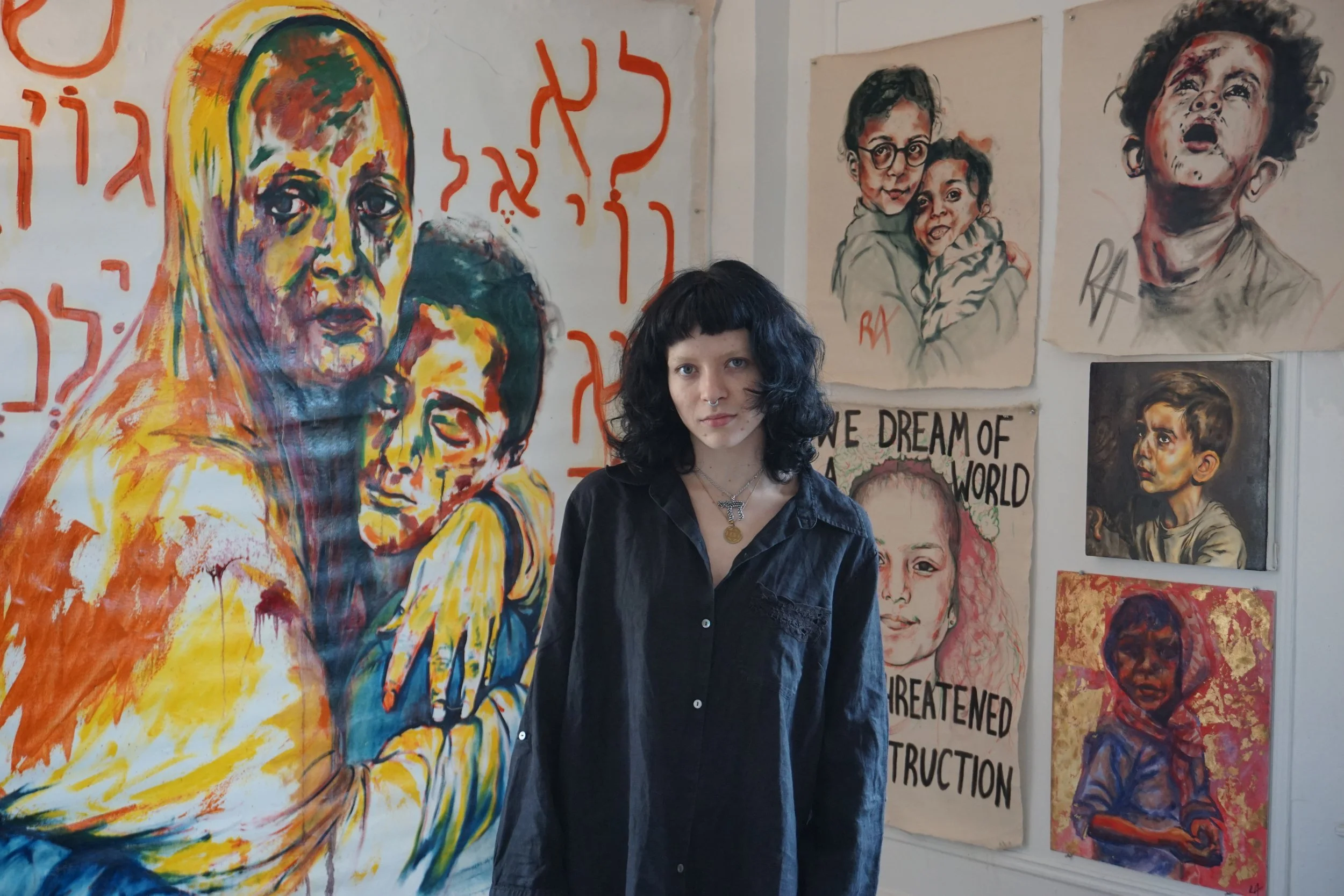Feature by Kayly Nguyen
Photos by Colson Struss






Stephanie Fuentes (BC ‘26) is a poet who unashamedly delves into the themes of grief and lust and their both vulgar and mundane depictions by using water as a thesis. She is currently preparing to graduate with an English degree and concentration in Creative Writing at Barnard College.
Stephanie Fuentes is still grieving.
She’s lingering in this feeling that’s taken root—first through her lungs, then through her veins and throughout her body.
It won’t go away.
She exhales and releases the feeling—but now it’s in the air surrounding her like perpetual stasis. Moving on is supposed to mean letting go, but grief won’t let her go.
That’s what poetry feels like for Stephanie Fuentes. Water comes in as a thesis and connects the poet and speaker together, a channel for all-consuming grief that would otherwise run unchecked in the body.
As such, Stephanie’s poetry intentionally does not inspire catharsis. It lingers in absence and in longing—in grief and in lust, which you would think are diametrically opposed. In reality, they’re two sides of the same coin: this desperate desire for what you cannot have in the moment—something just out of your reach.
Of course it’s sad. It’s painful.
But for someone looking for something to hold onto, it’s everything.
Stephanie Fuentes is a poet who grew up as the eldest daughter of a Mexican-American family and learned to thrive in the unpredictable wildness that comes with it. She’s a native to New York and has spent life moving between Staten Island, where her immediate family resides, and the Upper West Side with her grandparents, aunt, uncle, and cousin, who she was also extremely close with.
For secondary school, Stephanie left New York for Milton Academy in Massachusetts. Outside of the metropolitan bustle of daily life, Stephanie discovered a proximity to nature: an intimate connection with the world around her that eventually seeped into her poetry, which she describes by using water as a defining thesis.
When Stephanie returned to the city, that connection stayed with her. She’d often submerge herself in shallow ponds, like the third step of the childhood-defining pool in her uncle’s house, and sit, letting the emotions inside her flow like water: a substance that eventually leaves no trace in a container.
That parallel hit even harder when Stephanie lost her grandmother during the COVID-19 pandemic. She recalls close moments of her grandmother bathing her like a mother and spending every waking second with her.
A couple years later, Stephanie lost another mother figure in the form of her aunt. She describes grieving differently from her siblings and those around her, because to Stephanie, her aunt was everything, and it broke something in Stephanie to have to lose her—as if a part of her was lost when she died.
So, just as water leaves nothing behind, Stephanie remarks that “A headstone omits the actual person that was once there.” In the same way, Stephanie often draws on not only the presence of water as a defining element of her poetry but also the intentional absence of water: empty containers that used to hold water or rivers that have run dry, which also acts as an allegory for issues with sobriety.
Water, therefore, is almost universal in that way, whether it’s grief, love, or alcohol flowing into each other down the drain. Reminiscent of the phantom presence that water leaves behind, Stephanie believes that in poetry, even if something draws from a false memory, “It doesn’t make anything less real if the origin point was real.” The grief she felt over losing two mothers was real, no matter the fictional form it takes in her writing.
It’s the reason why Stephanie is so drawn to poetry: there is so much freedom to explore while inhabiting the persona of the poem’s speaker. She declares passionately that “I love the audacity in which you can cry for grief that's not your own. Making shit up is so important to poetry.”
“People forget that with the confessional day and age now,” Stephanie says. “I mean, I write confessional poetry, but the ‘I’ is never me. The ‘I’ is always the speaker, who's far removed.”
Stephanie revels in that same freedom to explore concepts usually seen as taboo and that are typically left unsaid. She enjoys writing about the “weird, warping, and vulgar forms of grief that overwhelm the speaker—the mundane and disgusting depictions of grief alike.” This is especially clear in “Chlorosis,” where the narrator subsists on material parts of a body left behind after loss:
“My sister asks, Why do you do this
to yourself.
Truth is, the year is still rendered as a year–
I find your hair strands striped along the unwashed
bedsheets and tape them to the bedroom walls.
They could be timbers. They could be longer.”
Stephanie also tends to incorporate an element of surprise into her poems. She visualizes her art as an experience for the reader, taking inspiration from how poet Yusef Komunyakaa describes his own work in relation to music. In fact, in a profile by the Academy of American Poets, Komunyakaa explained that "Jazz has space, and space equals freedom, a place where the wheels of imagination can turn and a certain kind of meditation can take place. It offers a meditational opportunity.”
In the same way, Stephanie describes her poetry as an “instrument of meditation.” She doesn’t want her poetry to influence. She says, “I want someone to read a poem of mine and like it—the way they would walk down a river or see a tree.”
This kind of intentional simultaneous surprise and experience for the reader is well showcased in “Alluvion,” where Stephanie remarks that, “If you just read it like this, you’re like, killing who? Killing myself.”
“The morning after I tried killing
myself, you
climbed into my bed and smoothed my
hair down the length of my back,
your soft fingers the water
carrying itself back to the harbor
There are things I would have done
had your love been smaller”
Stephanie’s unexpected enjambments serve to remind the reader that this poem is not about relief from overpowering emotions: it’s about living in a moment of grief with the poem’s speaker, where line by line takes you by surprise.
(It’s like: you—you what after that? There are things you would have done—done what?
Oh, I return to your love once again. I am left still grieving for you).
And at the end of the day, that’s what Stephanie writes poetry for: to be swallowed in the feeling of grief once again, like suffocating underwater. The reader just happens to experience it with her.
“I fell into poetry after this deep period of grief. And so, poetry was something that left this emotional residue on me. I was suffering and other people were suffering, but poetry was grief and that was it. That was all it needed to be. Just an acknowledgement of grief.”
So, Stephanie Fuentes is still grieving. She has not moved on.
Through poetry, she can let that be okay.
Work Cited
“Yusef Komunyakaa: An Argument against Simplicity.” Poets.Org, Academy of American Poets, 4 Apr. 2019, poets.org/text/yusef-komunyakaa-argument-against-simplicity.





























